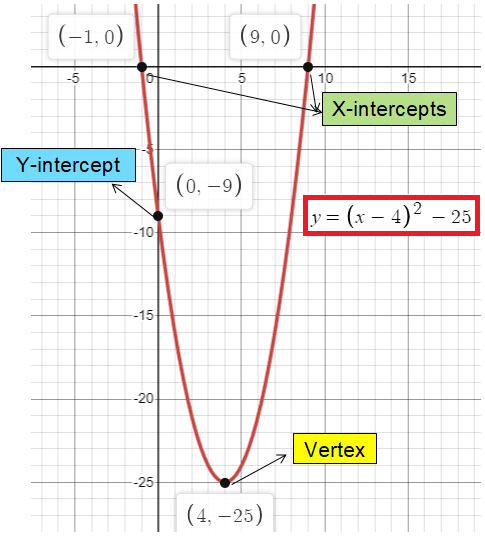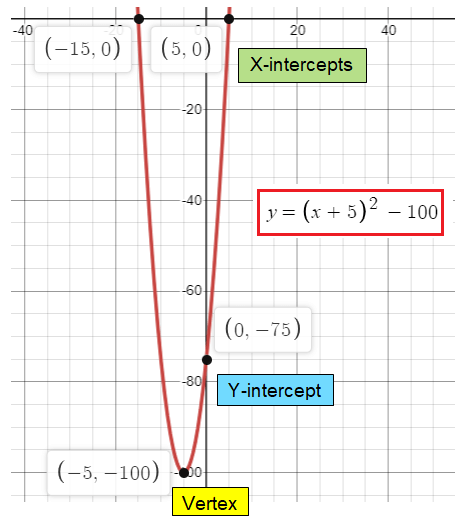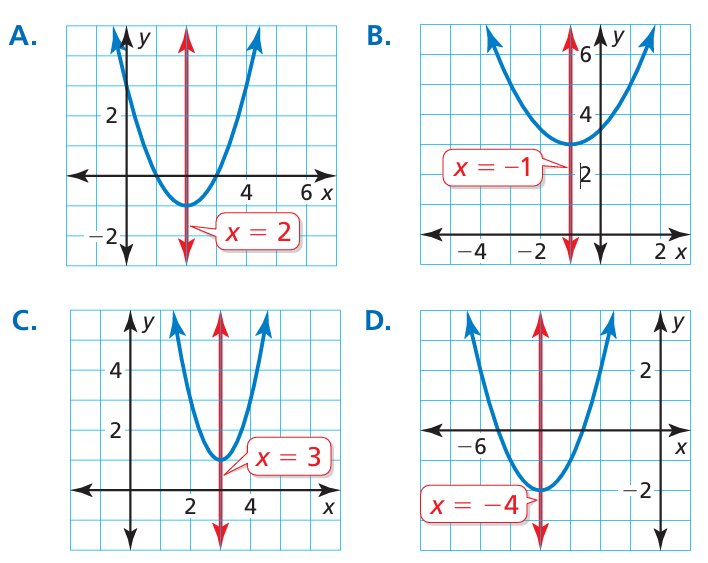GRAPHING QUADRATIC FUNCTIONS IN VERTEX FORM
Subscribe to our ▶️ YouTube channel 🔴 for the latest videos, updates, and tips.
What is vertex form ?
The quadratic function which is in the form
y = a(x - h)2 + k
is known as vertex form. Here (h, k) is vertex.
|
Value of a + - |
Direction up down |
Maximum or minimum Minimum Maximum |
Get zeroes :
The curve where it crosses the x-axis is known as x-intercept. By equating the quadratic function to zero and solving it, we will get zeroes or x-intercepts.
Get y-intercept :
To find y-intercept, we will equate x to 0.
Graph the following function.
Problem 1 :
y = (x - 4)2 - 25
Solution :
Finding vertex :
y = (x - 4)2 - 25
By comparing the given equation with vertex form
y = a(x - h)2 + k
we get (h, k) ==> (4, -25)
The vertex is at (4, -25).
Here a = 1 > 0, then the parabola opens up. It will have minimum.
Finding x-intercepts :
0 = (x - 4)2 - 25
(x - 4)2 = 25
x - 4 = √25
x - 4 = ±5
|
x - 4 = 5 x = 5 + 4 x = 9 |
x - 4 = -5 x = -5 + 4 x = -1 |
x-intercepts are (-1, 0) and (9, 0).
Finding y-intercept :
Put x = 0
y = (0 - 4)2 - 25
y = 16 - 25
y = -9
y-intercept is (0, -9)

Problem 2 :
y = (-1/2)(x + 3)2 + 8
Solution :
Finding vertex :
y = (-1/2)(x + 3)2 + 8
By comparing the given equation with vertex form
y = a(x - h)2 + k
we get (h, k) ==> (-3, 8)
The vertex is at (-3, 8).
Here a = -1/2 < 0, then the parabola opens down. It will have maximum.
Finding x-intercepts :
0 = (-1/2)(x + 3)2 + 8
(-1/2)(x + 3)2 + 8 = 0
(-1/2)(x + 3)2 = -8
Multiplying by 2 on both sides, we get
(x + 3)2 = 16
x + 3 = √16
x + 3 = ±4
|
x + 3 = 4 x = 4 - 3 x = 1 |
x + 3 = -4 x = -4 - 3 x = -7 |
x-intercepts are (1, 0) and (-7, 0).
Finding y-intercept :
Put x = 0
y = (-1/2)(0 + 3)2 + 8
y = -9/2 + 8
y = (-9+16)/2
y = 7/2
y-intercept is (0, 7/2)

Problem 3 :
y = (x + 5)2 - 100
Solution :
Finding vertex :
y = (x + 5)2 - 100
By comparing the given equation with vertex form
y = a(x - h)2 + k
we get (h, k) ==> (-5, -100)
The vertex is at (-5, -100).
Here a = 1 > 0, then the parabola opens up. It will have minimum.
Finding x-intercepts :
0 = (x + 5)2 - 100
(x + 5)2 - 100 = 0.
(x + 5)2 = 100
x + 5 = √100
x + 5 = ±10
|
x + 5 = 10 x = 10 - 5 x = 5 |
x + 5 = -10 x = -10 - 5 x = -15 |
x-intercepts are (5, 0) and (-15, 0).
Finding y-intercept :
Put x = 0
y = (0 + 5)2 - 100
y = 25 - 100
y = -75
y-intercept is (0, -75)

Problem 4 :
Use the axis of symmetry to match the equation with its graph.
a) y = 2(x − 3)2 + 1
b) y = (x + 4)2 − 2
c) y = 1/2 (x + 1)2 + 3
d) y = (x − 2)2 − 1

Solution :
By comparing the above functions with y = a(x - h)2 + k, we get the vertex in the form of (h, k).
Equation of axis of symmetry is x = h
a) y = 2(x − 3)2 + 1
we get h = 3 and k = 1
Equation of axis of symmetery x = 3
Option C is correct.
b) y = (x + 4)2 − 2
y = (x - (-4))2 − 2
we get h = -4 and k = -2
Equation of axis of symmetery x = -4
Option D is correct.
c) y = 1/2 (x + 1)2 + 3
y = 1/2(x - (-1))2 + 3
we get h = -1 and k = 3
Equation of axis of symmetery x = -1
Option B is correct.
d) y = (x − 2)2 − 1
we get h = 2 and k = -1
Equation of axis of symmetery x = 2
Option A is correct.
Problem 5 :
Two quadratic functions have graphs with vertices (2, 4) and (2, −3). Explain why you can not use the axes of symmetry to distinguish between the two functions.
Solution :
Axis of symmetry for the first function which has the vertex of (2, 4).
Equation of axis of symmetery :
x = 2
Axis of symmetry for the second function which has the vertex of (2, -3).
Equation of axis of symmetery :
x = 2
Equation of axis of symmetry for both functions they are the same, so you cannot differentiate these two functions.
Problem 6 :
A quadratic function is increasing to the left of x = 2 and decreasing to the right of x = 2. Will the vertex be the highest or lowest point on the graph of the parabola? Explain.
Solution :
The graph changes from increasing to decreasing, then it must have highest point on the parabola.
Subscribe to our ▶️ YouTube channel 🔴 for the latest videos, updates, and tips.
Recent Articles
-
Finding Range of Values Inequality Problems
May 21, 24 08:51 PM
Finding Range of Values Inequality Problems -
Solving Two Step Inequality Word Problems
May 21, 24 08:51 AM
Solving Two Step Inequality Word Problems -
Exponential Function Context and Data Modeling
May 20, 24 10:45 PM
Exponential Function Context and Data Modeling